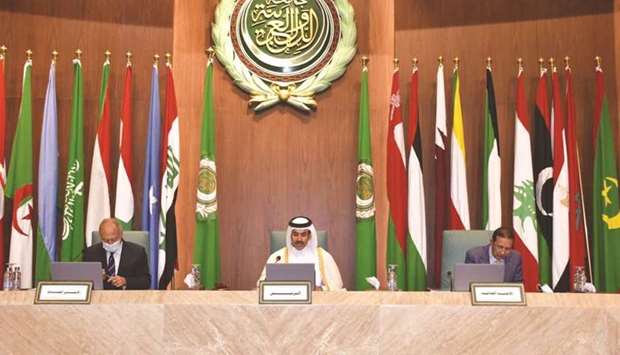The 13th meeting of the Arab League's Arab Ministerial Water Council began yesterday. Qatar's delegation at the meeting was chaired by HE Minister of State for Energy Affairs Saad bin Sherida al-Kaabi, who handed over the council's presidency to Lebanon's Minister of Energy and Water Walid Fayyad.
In his speech at the opening session, HE al-Kaabi said that today's meeting builds on the council's work since it held its first session in 2009. He said the meeting will review the developments related to water resources in the Arab world, and ways to protect Arab Water security and safeguarding the rights of future generations to live in security and prosperity. He expressed his hope that the meeting's recommendation will be a boost to co-operation, especially with the challenges posed by Covid-19 all over the world which requires compounding efforts to address them.
The minister noted that water is the main element for the conduct of any human activity, whether in the fields of economy, industry and agriculture, or in the fields of production and generation of energy and other various fields, something that enhances the importance of the issue which should be at the centre of the interest of decision makers and individuals alike.
He highlighted that the Arab world is facing political and social crises that are still having an impact on economic conditions of the people, stressing that this requires taking measures related to water policies that help alleviate these threats. He said that the Arab world must coordinate with research centers and organisations concerned with water, in order to implement the Arab Water Security 2030.
Qatar is committed to supporting all joint decisions issued by the council and has spared no effort throughout its presidency of the Arab Ministerial Council for Water in enabling the council's role to maintain water security in the Arab world at the official and popular levels.
He thanked the Arab League and the General-Secretariat of the Arab Ministerial Water Council for their efforts in ensuring the success of the consultative, scientific technical committee, and for following up on the initiative of regional Water scarcity, in addition to creating dialogue to find scientific solutions to these problems.
In his speech at the opening session, HE al-Kaabi said that today's meeting builds on the council's work since it held its first session in 2009. He said the meeting will review the developments related to water resources in the Arab world, and ways to protect Arab Water security and safeguarding the rights of future generations to live in security and prosperity. He expressed his hope that the meeting's recommendation will be a boost to co-operation, especially with the challenges posed by Covid-19 all over the world which requires compounding efforts to address them.
The minister noted that water is the main element for the conduct of any human activity, whether in the fields of economy, industry and agriculture, or in the fields of production and generation of energy and other various fields, something that enhances the importance of the issue which should be at the centre of the interest of decision makers and individuals alike.
He highlighted that the Arab world is facing political and social crises that are still having an impact on economic conditions of the people, stressing that this requires taking measures related to water policies that help alleviate these threats. He said that the Arab world must coordinate with research centers and organisations concerned with water, in order to implement the Arab Water Security 2030.
Qatar is committed to supporting all joint decisions issued by the council and has spared no effort throughout its presidency of the Arab Ministerial Council for Water in enabling the council's role to maintain water security in the Arab world at the official and popular levels.
He thanked the Arab League and the General-Secretariat of the Arab Ministerial Water Council for their efforts in ensuring the success of the consultative, scientific technical committee, and for following up on the initiative of regional Water scarcity, in addition to creating dialogue to find scientific solutions to these problems.

